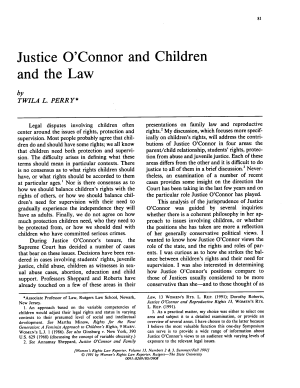Justice O'Connor and Children and the Law
January 1991

DISCLAIMER: This text has been transcribed automatically and may contain substantial inaccuracies due to the limitations of automatic transcription technology. This transcript is intended only to make the content of this document more easily discoverable and searchable. If you would like to quote the exact text of this document in any piece of work or research, please view the original using the link above and gather your quote directly from the source. The Sandra Day O'Connor Institute does not warrant, represent, or guarantee in any way that the text below is accurate.
Article Text
(Excerpt, Automatically generated)
Justice O'Connor and Children and the Law
by
TWILA L. PERRY*
Legal disputes involving children often center around the issues of rights, protection and supervision. Most people probably agree that chil dren do and should have some rights; we all know that children need both protection and supervi sion. The difficulty arises in defining what these terms should mean in particular contexts. There is no consensus as to what rights children should have, or what rights should be accorded to them at particular ages.1 Nor is there consensus as to how we should balance children's rights with the rights of others, or how we should balance chil dren's need for supervision with their need to gradually experience the independence they will have as adults. Finally, we do not agree on how much protection children need, who they need to be protected from, or how we should deal with children who have committed serious crimes.
During Justice O'Connor's tenure, the Supreme Court has decided a number of cases that bear on these issues. Decisions have been ren dered in cases involving students' rights, juvenile justice, child abuse, children as witnesses in sex ual abuse cases, abortion, education and child support. Professors Sheppard and Roberts have already touched on a few of these areas in their presentations on family law and reproductive rights.2 My discussion, which focuses more specif ically on children's rights, will address the contri butions of Justice O'Connor in four areas:
